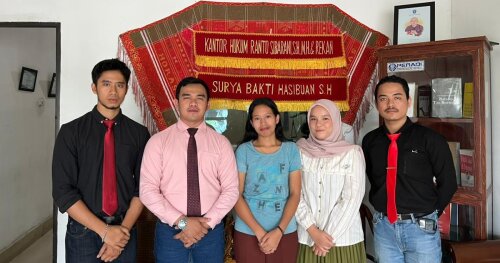Best Nonprofit & Charitable Organizations Lawyers in Indonesia
Share your needs with us, get contacted by law firms.
Free. Takes 2 min.
Or refine your search by selecting a city:
List of the best lawyers in Indonesia
About Nonprofit & Charitable Organizations Law in Indonesia
Nonprofit and charitable organizations in Indonesia play a critical role in addressing various social, economic, and environmental issues. These organizations are primarily regulated under the Law on Societal Organizations (Law No. 17 of 2013). This law governs the establishment, structure, and operational activities of nonprofit entities, covering social, religious, cultural, and other societal objectives. The establishment of Non-Governmental Organizations (NGOs), foundations, and associations falls under this legal framework, each with its specific requirements and operational guidelines.
Why You May Need a Lawyer
Engaging a lawyer might be necessary in several situations when dealing with nonprofit and charitable organizations in Indonesia. Common scenarios include:
- Understanding legal requirements for establishing a nonprofit entity, ensuring compliance with government regulations.
- Advising on corporate governance to ensure proper management and accountability within the organization.
- Assisting with drafting and reviewing legal documents such as bylaws, contracts, and partnership agreements.
- Handling disputes or litigation processes involving the organization.
- Guidance on tax exemptions and compliance with financial regulations.
- Navigating foreign funding restrictions and requirements for nonprofit donations.
Local Laws Overview
Key aspects of local laws relevant to nonprofit and charitable organizations in Indonesia include:
- Registration and Establishment: Nonprofits must register and obtain legal status through the Ministry of Law and Human Rights. NGOs, foundations, and similar entities have unique requirements for formation.
- Governance and Reporting: Organizations are required to have clear governance structures, often with a board of directors responsible for oversight, and must comply with regular financial reporting requirements.
- Taxation: Nonprofit entities might be eligible for certain tax exemptions, contingent upon their activities and adherence to reporting standards.
- Funding and Donations: There are specific regulations regarding the acceptance of domestic and international donations, requiring transparency and accountability in fund management.
- Operational Compliance: Regular audits and adherence to transparency standards are critical to maintaining good standing and public trust.
Frequently Asked Questions
What types of nonprofit organizations can be established in Indonesia?
In Indonesia, you can establish foundations (yayasan), associations (perkumpulan), and non-governmental organizations (NGOs). Each has distinct legal requirements and purposes.
Are foreign organizations allowed to operate in Indonesia?
Yes, foreign organizations can operate in Indonesia, but they must adhere to local laws and often need to partner with domestic entities for certain activities.
How do I register a nonprofit organization in Indonesia?
Registration involves creating a legal entity, drafting the articles of association, and obtaining approval from the Ministry of Law and Human Rights. Professional legal assistance is often advised.
What are the tax implications for nonprofit organizations?
Nonprofits might qualify for tax exemptions on income, but they must apply through and comply with the regulations of Indonesia's tax authorities.
Are there restrictions on receiving foreign funding?
Yes, receiving foreign funding requires compliance with specific governmental regulations, ensuring transparency and legal use of funds.
What is the role of a board of directors in a nonprofit?
A board of directors provides strategic oversight, ensures accountability, and manages legal and financial responsibilities of the organization.
How frequently do nonprofits need to report their activities?
Regular reporting is generally required annually, with financial audits often demanded to maintain compliance and public trust.
Can a nonprofit engage in commercial activities?
Nonprofits can engage in commercial activities if the profits are reinvested into the organization's objectives and operations.
What legal documentation is essential for nonprofit operation?
Key legal documents include articles of association, bylaws, operational licenses, and written agreements with partners or donors.
How can a nonprofit maintain compliance with Indonesian law?
Regular legal reviews, financial audits, adherence to governance practices, and transparent reporting can help ensure compliance with Indonesian law.
Additional Resources
Consider consulting these resources for further guidance:
- Ministry of Law and Human Rights: Offers detailed procedures and requirements for registering and operating nonprofit organizations.
- Ditjen Pajak (Directorate General of Taxes): Provides information on tax obligations and exemptions for nonprofit organizations.
- Local Legal Advisors: Engaging a local lawyer or consultant with expertise in nonprofit law can provide personalized advice and assistance.
Next Steps
If you need legal assistance in the field of nonprofit and charitable organizations in Indonesia, consider the following steps:
- Conduct preliminary research to understand the specific legal requirements for your intended organization type.
- Schedule consultations with legal professionals who specialize in nonprofit law for personalized advice.
- Prepare detailed documentation regarding your organization's mission, objectives, and operational plans.
- Work with your legal advisor to navigate the registration and compliance processes with relevant Indonesian authorities.
- Establish a relationship with accounting professionals to assist with ongoing financial and tax compliance.
Lawzana helps you find the best lawyers and law firms in Indonesia through a curated and pre-screened list of qualified legal professionals. Our platform offers rankings and detailed profiles of attorneys and law firms, allowing you to compare based on practice areas, including Nonprofit & Charitable Organizations, experience, and client feedback.
Each profile includes a description of the firm's areas of practice, client reviews, team members and partners, year of establishment, spoken languages, office locations, contact information, social media presence, and any published articles or resources. Most firms on our platform speak English and are experienced in both local and international legal matters.
Get a quote from top-rated law firms in Indonesia — quickly, securely, and without unnecessary hassle.
Disclaimer:
The information provided on this page is for general informational purposes only and does not constitute legal advice. While we strive to ensure the accuracy and relevance of the content, legal information may change over time, and interpretations of the law can vary. You should always consult with a qualified legal professional for advice specific to your situation.
We disclaim all liability for actions taken or not taken based on the content of this page. If you believe any information is incorrect or outdated, please contact us, and we will review and update it where appropriate.
Browse nonprofit & charitable organizations law firms by city in Indonesia
Refine your search by selecting a city.














